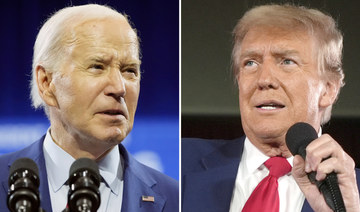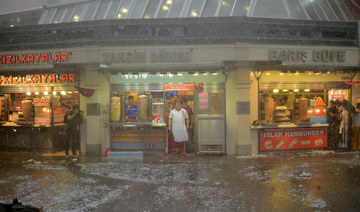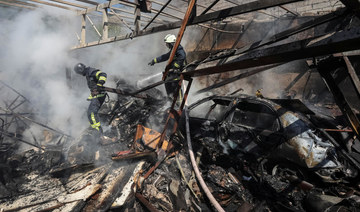Obi Emelonye had to battle Lagos airport bureaucrats, indifferent banks and skeptical peers to release his plane-crash thriller, a movie production on a scale rarely seen in Nigeria’s film industry.
“The biggest challenge was negotiating the diplomatic nightmare, potholes, even land-mines — taking over 100 people every day and passing them through security to go air-side with technical equipment,” the writer-director-producer says in an interview in London, after flying in from the Seattle International Film Festival.
“Every day we came, it was another story and I had to throw some money on the table usually to allow us to be able to shoot.”
“Last Flight to Abuja” was the highest-grossing West African film last year, taking in $350,000, with premieres in cinemas from London to Lagos.
It cost $250,000 to make, more than six times the typical budget in an industry known for shoddy shoots, poor production and filmmakers churning out features en masse to a nation of more than 160 million people, Africa’s most populous.
Emelonye, 46, is trying to avoid being another nobody whose movies go straight to DVD. He is making better- quality movies as he tries to attract a global audience to Nollywood which, like Bollywood, is a play on Hollywood.
Nigeria’s film industry, the world’s second largest by films made, generates about $800 million a year in revenue, according to London and Lagos-based distributor iROKO Partners Ltd.
Nigeria started producing movies in the 1960s, though modern Nollywood started with Kenneth Nnebue’s 1992 drama “Living in Bondage” establishing the themes of marital discord, greed and conflicts between Christianity and traditional faiths.
The West African nation made an average of 1,093 films a year between 2005 and 2009, second only to India’s 1,178 movies, according to the UNESCO Institute for Statistics.
A typical Nollywood film has a budget of $40,000, the largest producers make 20 to 40 titles a year and an average movie sells 50,000 copies, according to iROKO Partners, which distributes DVDs in Africa and streams videos for international subscribers online using a similar model to Netflix.
This year will see the release of an adaptation of Chimamanda Ngozi Adichie’s novel “Half of a Yellow Sun,” the most expensive movie filmed in Nigeria. Set during the country’s civil war in the 1960s, it cost $9 million.
Seventy percent of the funding was raised from Nigerian investors with the rest from Britain and the British Film Institute.
Directed and written by Nigerian novelist and playwright Biyi Bandele and filmed in the city of Calabar, the film places international actors Chiwetel Ejiofor and Thandie Newton alongside Nollywood stars such as Genevieve Nnaji.
The promotional trailer was the most viewed online among those being screened at the Toronto International Film Festival this year.
“One of the reasons for going to Toronto is to sell the film to distributors,” says Yewande Sadiku, an executive producer on the film and an investment banker at Stanbic IBTC Holding Co., who helped assemble the financing.
If the movie is a success, it may spur more funding, Sadiku says in an interview at the Federal Palace Hotel overlooking the Lagos lagoon, Nigeria’s commercial capital and home of Nollywood.
“Nollywood in size is big, but Nollywood in financial terms is piddly,” she says. “This film demonstrates what is possible.”
There is an appetite for well-made Nigerian films. Yet with a few more than 10 cinemas in the country and a disorderly distribution network, it’s hard for producers to recoup costs on higher-budget films, according to filmmaker Lonzo Nzekwe.
The 38-year-old director of 2010’s “Anchor Baby,” a drama about a Nigerian couple illegally living in the US, recouped the $200,000 it cost and made a small profit.
The movie was released in Nigerian, Ghanaian, British and Canadian theaters and won 12 awards at festivals. The first Nollywood movie available on iTunes is also on Nzekwe’s own video-on-demand website.
“Nigerians are doing well in international film festivals, it’s not about making a movie and going straight to DVD,” Nzekwe says in a phone interview.
Getting bank financing is nearly impossible, according to both Emelonye and Nzekwe, who relied on the support of family and friends.
Only a few companies — such as phone companies MTN Group, Emirates Telecommunications, and lenders such as Diamond Bank — have started sponsoring films and using Nollywood stars to market products.
Nigeria’s government has realized the potential of Nollywood, which employs 200,000 people directly and another million indirectly, according to Finance Minister Ngozi Okonjo- Iweala.
This year ministers started a three billion naira ($18.7 million) film training plan, while offering more tax relief, she says.
Nollywood needs better distribution of quality DVDs and a clampdown on piracy, according to Adi Nduka-Agwu, head of Africa business development for iROKO.
In response iROKO, which started in 2010, has built an audience of 6 million users across 178 countries with more than 5,000 movies that can be streamed online for about $5 a month.
Patchy Internet networks in Africa lead to many people watching DVDs instead of streaming online, Nduka-Agwu says in an interview in Johannesburg.
iROKO started supplying Nollywood DVDs to 150 retail outlets in Johannesburg in June and is looking to expand further in Africa’s biggest economy. The company has had its first request from a distributor to supply to Zimbabwe, she says.
With his next three films, Emelonye is hoping that banks, investors and companies begin to realize Nollywood’s potential.
Emelonye is confident that his movies will soon generate enough box office to persuade banks to back them.
“With that you can raise your standards, get bigger stars from across the world,” he says.
Nigeria’s Nollywood goes global as filmmakers fight for more cash
Nigeria’s Nollywood goes global as filmmakers fight for more cash

‘Miracle’ survivor found 5 days after building collapse

- When we went down to the side of the slab we had uncovered, we heard somebody inside, and we stopped all the heavy operations
JOHANNESBURG: Rescuers and onlookers cheered and applauded on Saturday as a survivor was rescued after 116 hours from underneath the rubble of a collapsed building in South Africa, with the tragedy having killed at least 13.
Provincial premier Alan Winde said on X: “It is a miracle that we have all been hoping for.”
An apartment block under construction in the southern city of George crumbled on Monday afternoon while an 81-person crew was on site.
“When we went down to the side of the slab we had uncovered, we heard somebody inside, and we stopped all the heavy operations,” Colin Deiner, head of rescue operations, told reporters.
Rescuers then called out to the survivor, and he spoke back, Deiner said.
“He indicated to us that he’s got weight on his legs, and we’re very concerned about that after such a long period.” After several hours, the survivor was extricated and rushed to a hospital.
Rescue teams have been working against time since the structure came crashing down.
Twenty-nine people were rescued alive, while thirty-nine remained unaccounted for.
Winde said a “difficult” identification process was underway, and police were using fingerprints, DNA testing, and photographs.
The city had approved construction plans for a 42-unit apartment block in July.
The reasons for the collapse are still unknown.
Biden jokes Trump should have injected himself with bleach

- Biden also made light of Trump’s “love letters” from North Korean leader Kim Jong Un
- In a senior moment, Biden mistakenly referred to Kim as the president of South Korea
PORTOLA VALLEY, California: US President Joe Biden joked on Friday that he wished former President Donald Trump had injected himself with a little bleach, resurrecting one of Trump’s more head-scratching moments from the early days of the coronavirus pandemic.
Biden, at a fundraising event south of San Francisco for his re-election campaign, said the presidency of his Republican opponent was chaotic and that voters should keep that in mind. Biden and Trump are locked in a close contest ahead of the November election.
“Remember him saying the best thing to do is just inject a little bleach in your arm? That’s what he said. And he meant it. I wish he had done a little bit himself,” Biden said.
During the early months of the pandemic in 2020, Trump said that an “injection inside” the human body with a disinfectant like bleach or isopropyl alcohol could help protect against the virus.
Biden also made light of what he called Trump’s “love letters” from North Korean leader Kim Jong Un, although Biden mistakenly referred to Kim as the president of South Korea.
Trump had met with Kim and exchanged a number of letters with him, copies of which he kept in a loose-leaf binder in the Oval Office.
A spokesperson for the Trump campaign did not immediately respond to a request for comment on Biden’s remarks.
Biden has made light of Trump’s bleach comment before, saying on April 24 in Washington that Trump had injected himself and “it all went to his hair.”
Meaty issue: German political party calls for €4.90 price cap on doner kebabs
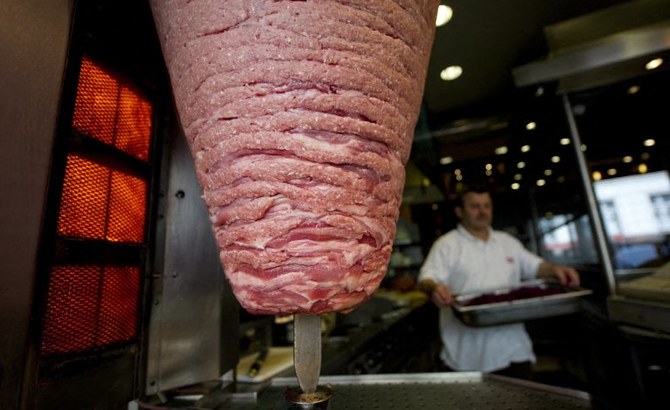
- Die Linke appeals to government as price of national favorite hits €10 in some cities
- Scheme would cost taxpayer about €4bn
LONDON: German political party Die Linke has urged the government to cap the price of a much loved food item — the doner kebab.
The party has proposed providing daily vouchers to households that would limit prices to €4.90 ($5.28) and €2.90 for young people under an initiative known as Donerpreisbremse.
The scheme is projected to cost the government about €4 billion.
Introduced after the Second World War by Turkish immigrants who adapted the dish to suit local tastes, the doner kebab is a national favorite in Germany, with an estimated 1.3 billion consumed annually. But their soaring price has become a hot-button political issue.
Die Linke said the cost of a doner kebab had reached €10 in some cities, from €4 just two years ago.
“For young people right now it is an issue as important as where they will move when they leave home,” said Hanna Steinmuller, a lawmaker with the Greens party.
“I know it’s not an everyday issue for many people here … but I think as voter representatives we are obliged to highlight these different perspectives.”
German Chancellor Olaf Scholz was famously confronted by a voter last year who demanded he “speak with Putin … I’m paying €8 for a doner.”
With public pressure mounting, Scholz recently acknowledged on social media that “everywhere I go, mostly by young people, I get asked if there should be a price cap for doner kebabs.”
Despite the appeals, the chancellor rejected the proposal, citing the impracticality of price controls in a free market economy.
Despite its humble origins as a street food, the doner kebab has become an unexpected point of political focus.
Last month, German President Frank-Walter Steinmeier sparked controversy when on a visit to Turkiye he gifted 60 kg of kebab meat from Berlin to Istanbul in what some called a clumsy attempt to symbolize the strong cultural ties between the two nations.
A 98-year-old in Ukraine walked miles to safety from Russians, with slippers and a cane
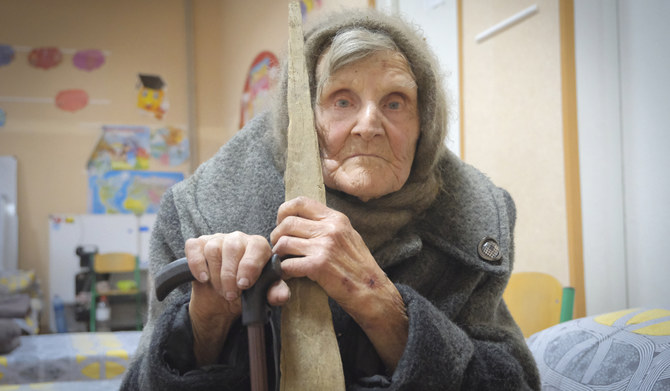
- Describing her journey, the nonagenarian said she had fallen twice and was forced to stop to rest at some points, even sleeping along the way before waking up and continuing her journey
KYIV, Ukraine: A 98-year-old woman in Ukraine who escaped Russian-occupied territory by walking almost 10 kilometers (6 miles) alone, wearing a pair of slippers and supported by a cane has been reunited with her family days after they were separated while fleeing to safety.
Lidia Stepanivna Lomikovska and her family decided to leave the frontline town of Ocheretyne, in the eastern Donetsk region, last week after Russian troops entered it and fighting intensified.
Russians have been advancing in the area, pounding Kyiv’s depleted, ammunition-deprived forces with artillery, drones and bombs.
“I woke up surrounded by shooting all around — so scary,” Lomikovska said in a video interview posted by the National Police of Donetsk region.
In the chaos of the departure, Lomikovska became separated from her son and two daughters-in-law, including one, Olha Lomikovska, injured by shrapnel days earlier. The younger family members took to back routes, but Lydia wanted to stay on the main road.
With a cane in one hand and steadying herself using a splintered piece of wood in the other, the pensioner walked all day without food and water to reach Ukrainian lines.
Describing her journey, the nonagenarian said she had fallen twice and was forced to stop to rest at some points, even sleeping along the way before waking up and continuing her journey.
“Once I lost balance and fell into weeds. I fell asleep … a little, and continued walking. And then, for the second time, again, I fell. But then I got up and thought to myself: “I need to keep walking, bit by bit,’” Lomikovska said.
Pavlo Diachenko, acting spokesman for the National Police of Ukraine in the Donetsk region, said Lomikovska was saved when Ukrainian soldiers spotted her walking along the road in the evening. They handed her over to the “White Angels,” a police group that evacuates citizens living on the front line, who then took her to a shelter for evacuees and contacted her relatives.
“I survived that war,’ she said referring to World War II. “I had to go through this war too, and in the end, I am left with nothing.
“That war wasn’t like this one. I saw that war. Not a single house burned down. But now – everything is on fire,” she said to her rescuer.
In the latest twist to the story, the chief executive of one of Ukraine’s largest banks announced on his Telegram channel Tuesday that the bank would purchase a house for the pensioner.
“Monobank will buy Lydia Stepanivna a house and she will surely live in it until the moment when this abomination disappears from our land,” Oleh Horokhovskyi said.
Amazon Purr-rime: Cat accidentally shipped to online retailer
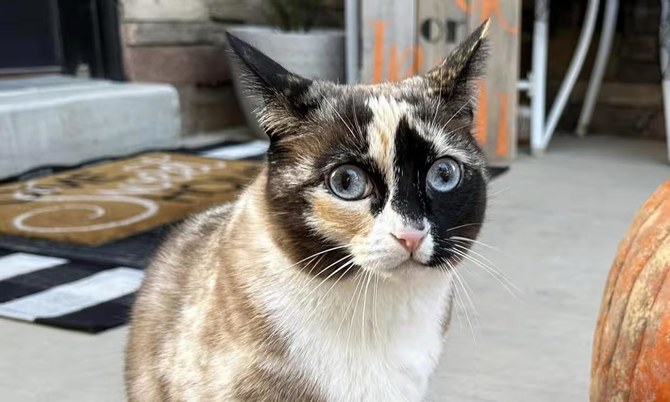
- Galena was found safe by a warehouse worker at an Amazon center after vanishing from her home in Utah
LOS ANGELES: A curious cat that sneaked into an open box was shipped across the United States to an Amazon warehouse after its unknowing owners sealed it inside.
Carrie Clark’s pet, Galena, vanished from her Utah home on April 10, sparking a furious search that involved plastering “missing” posters around the neighborhood.
But a week later, a vet hundreds of miles (kilometers) away in Los Angeles got in touch to say the cat had been discovered in a box — alongside several pairs of boots — by a warehouse worker at an Amazon center.
“I ran to tell my husband that Galena was found and we broke down upon realizing that she must have jumped into an oversized box that we shipped out the previous Wednesday,” Clark told KSL TV in Salt Lake City.
“The box was a ‘try before you buy,’ and filled with steel-toed work boots.”
Clark and her husband jetted to Los Angeles, where they discovered Amazon employee Brandy Hunter had rescued Galena — a little hungry and thirsty after six days in a cardboard box, but otherwise unharmed.
“I could tell she belonged to someone by the way she was behaving,” said Hunter, according to Amazon.
“I took her home that night and went to the vet the next day to have her checked for a microchip, and the rest is history.”




